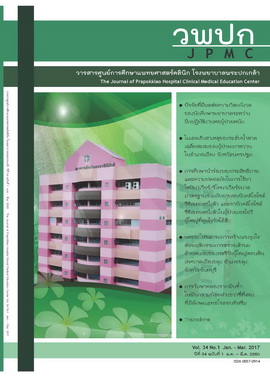ปัจจัยที่มีผลต่อความวิตกกังวลของนักศึกษาพยาบาลระหว่างฝึกปฏิบัติงานหอผู้ป่วยหนักปัจจัยที่มีผลต่อความวิตกกังวลของนักศึกษาพยาบาลระหว่างฝึกปฏิบัติงานหอผู้ป่วยหนัก
Main Article Content
Abstract
ที่มาของปัญหา: นักศึกษาพยาบาลถือว่าเป็นกลุ่มเสี่ยงต่อการเกิดปัญหาสุขภาพจิต เช่นความเครียด ความวิตกกังวล และภาวะซึมเศร้าเนื่องมาจากการที่ต้องฝึกปฏิบัติจริงจากภาคทฤษฎีที่ได้ศึกษามาแล้ว โดยเฉพาะการปฏิบัติการพยาบาลผู้ป่วยที่มีภาวะวิกฤติ
วัตถุประสงค์: เพื่อศึกษาปัจจัยที่มีผลต่อความวิตกกังวลของนักศึกษาพยาบาลระหว่างฝึกปฏิบัติงานหอผู้ป่วยหนัก
วัสดุและวิธีการ: การวิจัยนี้เป็นการศึกษาปัจจัยที่มีผลต่อความวิตกกังวลของนักศึกษาพยาบาลขณะฝึกปฏิบัติงานหอผู้ป่วยหนัก กลุ่มตัวอย่างเป็นนักศึกษาพยาบาลชั้นปีที่ 3 จำนวน 100 คนที่เรียนในหลักสูตรพยาบาลศาสตรบัณฑิตของวิทยาลัยพยาบาลบรมราชชนนี พระพุทธบาท เก็บข้อมูลโดยใช้แบบสอบถามเกี่ยวกับข้อมูลส่วนบุคคล เครื่องมือวัดความวิตกกังวลของสปิลเบอร์เกอร์และวิเคราะห์ปัจจัยที่มีผลต่อความวิตกกังวลของนักศึกษาพยาบาลขณะฝึกปฏิบัติงานหอผู้ป่วยหนักโดยใช้สถิติวิเคราะห์สมการถดถอยพหุคูณ (multiple regression analysis)
ผลการศึกษา: ผลการศึกษาพบว่า ปัจจัยที่มีผลต่อความวิตกกังวลด้านการรับรู้ความสามารถของตนเอง ด้านการรับรู้เกี่ยวกับอุปกรณ์/เครื่องมือบนหอผู้ป่วยหนัก และด้านอาจารย์นิเทศหรือพยาบาลพี่เลี้ยง สามารถร่วมกันทำนายความวิตกกังวลขณะฝึกปฏิบัติงานหอผู้ป่วยหนักของนักศึกษาพยาบาลชั้นปีที่ 3 ได้ร้อยละ 94 และพบว่านักศึกษามีความกลัวการฝึกปฏิบัติงาน ไม่คุ้นเคยกับเครื่องมือในหอผู้ป่วย ขาดความรู้และกลัวการconference กับอาจารย์
สรุป: จากผลการศึกษา พบว่า การได้มีโอกาสเรียนรู้ ชี้แนะ และฝึกการใช้อุปกรณ์ เครื่องมือเครื่องใช้ในหอผู้ป่วยวิกฤตเพิ่มมากขึ้น ความคุ้นเคยกับอาจารย์ผู้สอนหรืออาจารย์พี่เลี้ยง ตลอดจนการสนับสนุนและเสริมสร้างให้รับรู้ความสามารถของตนจะช่วยลดความวิตกกังวลของนักศึกษาขณะขึ้นปฏิบัติงานได้
Affecting Factors on Nursing Students Anxiety while Practicing in Intensive Care Unit
Abstract
Background : Clinical experience has always been an integral part of nursing education. It prepares student nurses to be able of "doing" as well as "knowing" the clinical principles in practice. And it has known that stress and anxiety in nursing education is acknowledged as one of the most important issues in the modern world, especially when practicing in the intensive care units. (ICU)
Objective: The objective of this study was to identify the predictors and factors associated with anxiety of nursing students while practicing in intensive care unit.
Method: This descriptive correlation study examined nursing students’ medication competence and associated factors affecting their stress and anxiety while practicing in intensive care unit. Ponticipunts Whe 100 nursing students, the third year of Bachelor nursing curriculum of Boromarajonani College of Nursing Pha - Phutthabat. Data were collected by a demographic questionnaire and Spielberger Anxiety Questionnaire. Stepwise multiple regressions were used to analyze predictive factors on nursing students’ anxiety.
Results: The results showed that (1) self - ability perception of nursing students, (2) nursing instructors or nursing preceptors, and (3) the perception of ICU instrumentation, accounted for 94 percent of the variance in nursing students’ anxiety. And the open question showed that the students fear about applying unfamiliar medical equipments in ICU and they also fear about nursing conference with their teacher.
Conclusion: It is suggested that nursing students who have better theoretical medication competence are also more self - confident in medication management and feel of anxiety less associated with fear of being tested.

